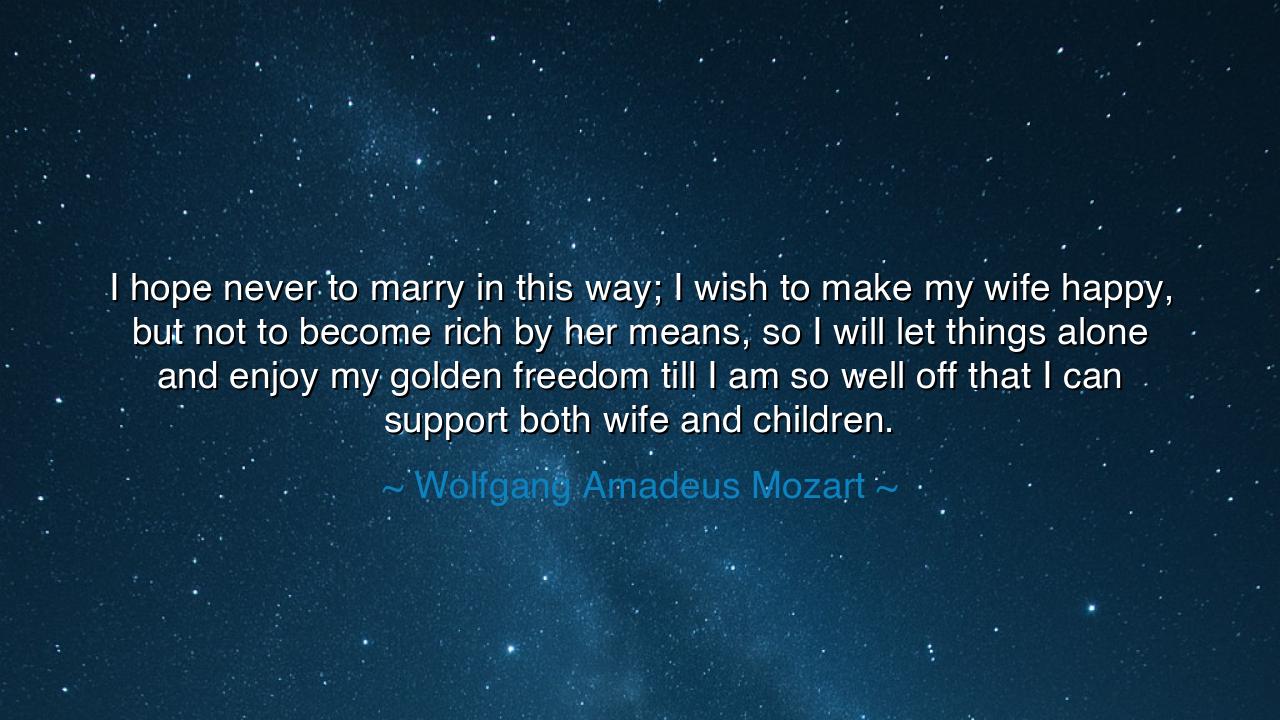
I hope never to marry in this way; I wish to make my wife happy
I hope never to marry in this way; I wish to make my wife happy, but not to become rich by her means, so I will let things alone and enjoy my golden freedom till I am so well off that I can support both wife and children.






In the noble and earnest words of Wolfgang Amadeus Mozart, one of history’s greatest artists, we hear not only the voice of a composer, but of a man who sought honor before comfort, and love before advantage: “I hope never to marry in this way; I wish to make my wife happy, but not to become rich by her means, so I will let things alone and enjoy my golden freedom till I am so well off that I can support both wife and children.” These words, written in his youth, reveal a heart guided not by ambition’s glitter, but by principle, dignity, and freedom. They remind us that the truest form of love is not one that takes, but one that gives; and that a life of integrity, though humbler, is richer than one built on convenience or greed.
The origin of this quote lies in a letter Mozart wrote to his father, Leopold, during a time when many urged him to marry advantageously — to secure wealth or status through union rather than merit. Yet Mozart, though born into a world where musicians were servants and noble titles ruled every ambition, refused such compromise. He valued his “golden freedom”, the independence to live and work on his own terms, even if it meant struggle. For Mozart understood something eternal: that to trade one’s liberty or virtue for comfort is to impoverish the soul. His art, born of that very freedom, stands as proof that greatness is not sustained by wealth, but by the courage to remain true to one’s heart.
The ancients would have praised such resolve. The philosopher Socrates once said that wealth does not bring goodness, but goodness brings wealth — not of gold, but of spirit. In the same way, Mozart’s choice was not one of mere practicality; it was a moral stand. To him, marriage was sacred — a union of hearts, not of fortunes. To marry for gain was to profane both love and art, to reduce what was holy to a transaction. His words remind us that integrity is the music of the soul, and that harmony in life, as in composition, can only exist when every note is guided by truth.
Consider also the example of Marcus Aurelius, the philosopher-emperor of Rome, who lived amid unimaginable luxury yet wrote, “Wealth consists not in having great possessions, but in having few wants.” Mozart, like Marcus, saw freedom as the greatest treasure. Though he walked among courts and kings, he refused to become their ornament. He chose instead the path of self-reliance, believing that the honor of a man rests not in what he inherits or gains through others, but in what he earns through his own labor and virtue. His golden freedom was not idleness — it was the discipline to be bound only to his conscience and his craft.
And indeed, Mozart’s life bore the cost of that conviction. He lived without the comfort of riches, often writing his masterpieces under financial strain, yet he never allowed poverty to corrupt his purpose. The brilliance of his music — the divine laughter of The Marriage of Figaro, the grace of Eine kleine Nachtmusik, the glory of The Magic Flute — was born from the very freedom he refused to surrender. Each note was his declaration that joy, love, and integrity are worth more than silver or gold. Though he left this world too soon, he left it ennobled — not by wealth, but by truth lived through art.
Mozart’s words also speak to a broader human struggle — the temptation to compromise what is sacred for what is easy. Every age has its merchants of comfort who promise happiness through possession, through status, through gain. But the wise know that love cannot be bought, nor can integrity be traded without loss. To marry — or to live — for advantage is to build a palace on sand. The true foundation of happiness is character, for from it flows trust, peace, and genuine affection. The man or woman who loves freely, without condition or expectation, lives closer to the divine.
Therefore, my child, take this teaching to heart: do not sell your freedom for fleeting security, nor your honor for comfort. Choose the slower road if it leads to truth. In love, in work, in all things — seek to give more than you take. For the greatest wealth is not what you receive, but what you are willing to offer. When you can say, as Mozart did, “I will wait until I can support those I love,” then you have already built the richest foundation of all — the foundation of self-respect and sincerity.
So let Mozart’s words be your guide: enjoy your golden freedom, not as an escape, but as a preparation — the time in which you refine your gifts and strengthen your soul. When love comes, let it find you not hungry for gain, but full of grace, ready to give yourself wholly. For in the music of life, it is the honest heart that composes the most beautiful song — one that echoes long after the world’s applause has faded.






AAdministratorAdministrator
Welcome, honored guests. Please leave a comment, we will respond soon